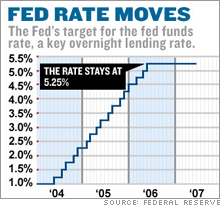Bernanke: Fed ready to actThe Fed chairman says the housing market could weaken further and that the Fed is following the mortgage meltdown 'closely.'NEW YORK (CNNMoney.com) -- Federal Reserve chairman Ben Bernanke described the recent housing downturn as "sharp" and added "that further declines in homebuilding are likely" in a highly anticipated speech Friday morning. But he also hinted that the central bank was prepared to cut rates if necessary, news that may soothe jittery investors. Stocks, which were trading significantly higher before Bernanke's prepared remarks were made public, initially gave up some of their gains following the release of the speech. But they bounced back a bit as the day progressed and investors turned to President Bush's speech about reforming the mortgage market. The Dow closed up more than 119 points, or 0.9 percent, while the S&P 500 and Nasdaq both gained more than 1 percent. Bernanke, making the remarks at the Federal Reserve Bank of Kansas City's Economic Symposium in Jackson Hole, Wy., said that "if current conditions persist in mortgage markets, the demand for homes could weaken further, with possible implications for the broader economy." He added that the Fed was "following these developments closely." Concerns about increased defaults by subprime mortgage borrowers, consumers with poor credit histories, have rattled Wall Street, causing wild swings in stocks over the past month and prompting the Fed to cut its discount rate two weeks ago. Bernanke further explained the reason behind the cut of the discount rate, which is what banks pay to borrow money from the Fed, in his speech and added that the Fed was ready to take more action if need be. He said that the purpose of the discount rate cut was to assure that funds would be available to banks and "alleviate concerns about funding that might otherwise constrain depositories from extending credit or making markets" and that "the Federal Reserve stands ready to take additional actions as needed to provide liquidity and promote the orderly functioning of markets." Investors were eagerly awaiting Bernanke's comments ahead of the long Labor Day holiday weekend Friday in order to see if there would be any clues as to whether the Fed would lower the federal funds rate, which influences the rates on various consumer loans, at its next meeting on September 18, if not before. One economist said that it is increasingly likely the market's growing wish for a rate cut will be met. "This looks like the Fed will cut rates on September 18. Obviously, events between now and then can change things but the markets are priced to the expectation that the fed, will at the very minimum, cut rates by a quarter of a point," said Keith Hembre, chief economist with First American Funds in Minneapolis. Ashraf Laidi, chief currency analyst with CMC Markets US, a currency brokerage firm, added that he thinks the Fed will cut the fed funds rate by a quarter of a percentage point in September and one more time after that, leaving rates at 4.75 percent by the end of the year. "The market is getting some sense of assurance from Bernanke's remarks, the reiteration that the Fed will do what is needed," he said. Hembre said that investors might also be encouraged by the fact that Bernanke said the Fed would rely more on anecdotal evidence going forward and not solely on hard, historical data. Bernanke, an academic by training, has been criticized by some for being out of touch with what is really going on in the economy and that he should be more like his predecessor Alan Greenspan, who was quicker to react to economic and market crises. "Even though he's an academic, he has to realize the limitations of hard data. The Fed is going to have to take into account anecdotal pieces of information and make judgments based on them," Hembre said. In his speech, Bernanke conceded that "in light of recent financial developments, economic data bearing on past months or quarters may be less useful than usual for our forecasts of economic activity and inflation. Consequently, we will pay particularly close attention to the timeliest indicators, as well as information gleaned from our business and banking contacts around the country." But Bernanke maintained that it is not the Fed's responsibility to bail out borrowers who took on risky loans or the financial institutions that made them, saying that it would not be "appropriate...to protect lenders and investors from the consequences of their financial decisions." Nonetheless, he did say that "developments in financial markets can have broad economic effects felt by many outside the markets, and the Federal Reserve must take those effects into account when determining policy." Bernanke also said that there is a risk that "the further tightening of credit conditions, if sustained, would increase the risk that the current weakness in housing could be deeper or more prolonged than previously expected, with possible adverse effects on consumer spending and the economy more generally." Still, both Laidi and Hembre said Bernanke's remarks were not too surprising since they differed little from what the Fed said about the economy in the minutes from its August 7 meeting, which were released earlier this week. The Fed indicated in those minutes that it was keeping an eye on the woes in the credit markets but it ultimately decided against a rate cut at that meeting. But David Resler, chief economist for Nomura Securities International Inc., said it was important for Bernanke to further hammer home the notion that the Fed now gets how significant the mortgage crisis is. And Resler thinks he succeeded in that regard. "It's more than a reiteration. It's reiteration with added context. Bernanke didn't say anything substantively new but he verifies the obvious. The turmoil has the potential to change the economic outlook and until we know more, the Fed needs to proceed cautiously," Resler said. |
| ||||




